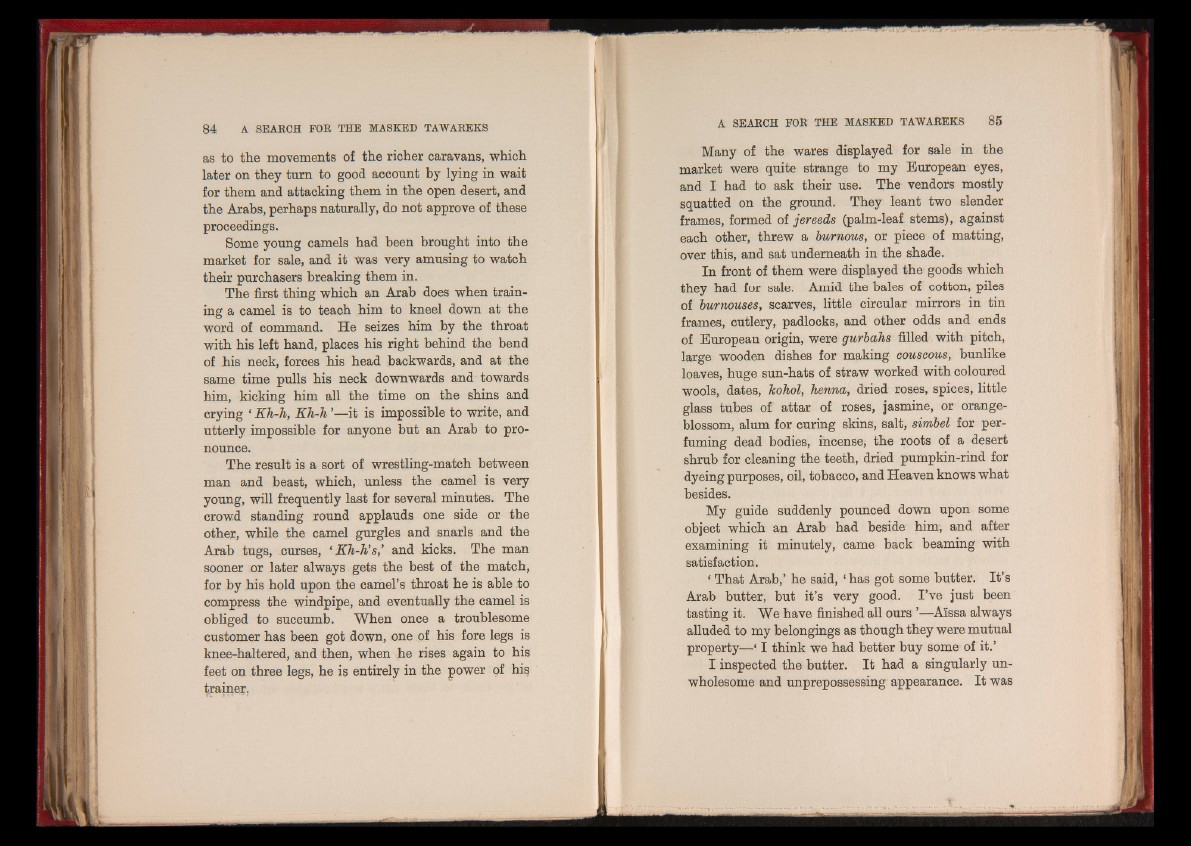
as to the movements of the richer caravans, which
later on they turn to good account by lying in wait
for them and attacking them in the open desert, and
the Arabs, perhaps naturally, do not approve of these
proceedings.
Some young camels had been brought into the
market for sale, and it was very amusing to watch
their purchasers breaking them in.
The first thing which an Arab does when training
a camel is to teach him to kneel down at the
word of command. He seizes him by the throat
with his left hand, places his right behind the bend
of his neck, forces his head backwards, and at the
same time pulls his neck downwards and towards
him, kicking him all the time on the shins and
crying ‘ Kh-h, Kh-h ’—it is impossible to write, and
utterly impossible for anyone but an Arab to pronounce.
The result is a sort of wrestling-match between
man and beast, which, unless the camel is very
young, will frequently last for several minutes. The
crowd standing round applauds one side or the
other, while the camel gurgles and snarls and the
Arab tugs, curses, ‘Kh-h’s,’ and kicks. The man
sooner or later always gets the best of the match,
for by his hold upon the camel’s throat he is able to
compress the windpipe, and eventually the camel is
obliged to succumb. When once a troublesome
customer has been got down, one of his fore legs is
knee-haltered, and then, when he rises again to his
feet on three legs, he is entirely in the power of hiss
trainer.
Many of the wares displayed for sale in the
market were quite strange to my European eyes,
and I had to ask their use. The vendors mostly
squatted on the ground. They leant two slender
frames, formed of jereeds (palm-leaf stems), against
each other, threw a burnous, or piece of matting,
over this, and sat underneath in the shade.
In front of them were displayed the goods which
they had for sale. Amid the bales of cotton, piles
of burnouses, scarves, little circular mirrors in tin
frames, cutlery, padlocks, and other odds and ends
of European origin, were gurbahs filled with pitch,
large wooden dishes for making couscous, bunlike
loaves, huge sun-hats of straw worked with coloured
wools, dates, Jcohol, henna, dried roses, spices, little
glass tubes of attar of roses, jasmine, or orange-
blossom, alum for curing skins, salt, simbel for perfuming
dead bodies, incense, the roots of a desert
shrub for cleaning the teeth, dried pumpkin-rind for
dyeing purposes, oil, tobacco, and Heaven knows what
besides.
My guide suddenly pounced down upon some
object which an Arab had beside him, and after
examining it minutely, came back beaming with
satisfaction.
‘ That Arab,’ he said, * has got some butter. I t’s
Arab butter, but it’s very good. I ’ve just been
tasting it. We have finished all ours ’—Alssa always
alluded to my belongings as though they were mutual
property—‘ I think we had better buy some of it.’
I inspected the butter. It had a singularly unwholesome
and unprepossessing appearance. It was